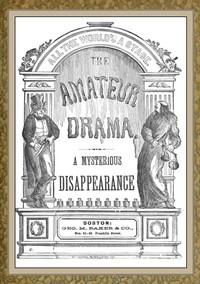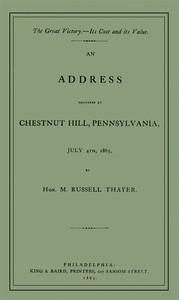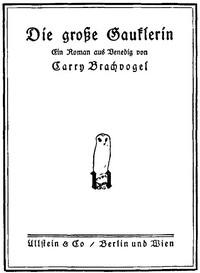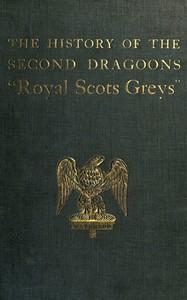Read this ebook for free! No credit card needed, absolutely nothing to pay.
Words: 49674 in 25 pages
This is an ebook sharing website. You can read the uploaded ebooks for free here. No credit cards needed, nothing to pay. If you want to own a digital copy of the ebook, or want to read offline with your favorite ebook-reader, then you can choose to buy and download the ebook.
CHAP. PAGE
A HUMBLE ENTERPRISE
THE GOVERNOR-GENERAL
Joseph Liddon was deaf, and one day, when he was having a holiday in the country, he crossed a curving railway line, and a train, sweeping round the corner when he was looking another way, swept him out of existence. On his shoulder he was carrying the infrequent and delightful gun--reminiscent of happy days in English coverts and stubble fields--and in his hand he held a dangling hare, about the cooking of which he was dreaming pleasantly, wondering whether his wife would have it jugged or baked. When they stopped the train and gathered him up, he was as dead as the hare, dissolved into mere formless tatters, and his women-folk were not allowed to see him afterwards. They came up from town to the inquest and funeral--wife and two daughters, escorted by a downy-lipped son--all dazed and bewildered in their suddenly transformed world; and a gun and a broken watch and a few studs, that had been carefully washed and polished, were the only "remains" on which they could expend the valedictory kiss and tear. Their last memory of him was full of the gay bustle of farewell at Spencer Street when he set forth upon his trip. It was such an event for him to have a holiday, and to go away by himself, that the whole family had to see him off. Even young Joe was on the platform to carry his father's bag, and buy him the evening papers, his train being the Sydney express, which did not leave till after office hours. When they knew how the holiday had ended, their bitter regrets for not having accompanied him further were greatly soothed by the knowledge that they had gone with him so far--had closed their life together with an act of love that had made him happy.
He had been born a gentleman in the technical sense, and had lived a true man in every sense. In spite of this--to a great extent, probably, because of it--he had not been very successful in the world; that is to say, he had not made himself important or rich. Money had not come to him with his gentle blood, and he had not had the art to command it, nor ever would have had. It is a pursuit that requires the whole energies of one's mind, and his mind had been distributed a good deal. He was fond of books, which was a fatal weakness; he was fond of little scientific experiments, which was worse; he was indifferent to the sovereign rule of public opinion and the advantages enjoyed by those who can cut a dash, which was worst of all. And, besides, he was deaf. He had begun to grow deaf when quite a young man, after having a fever, and by the time he was fifty one had to shout at him.
So, when at fifty-six he met his untimely end, because he could not hear the train behind him, he was in the position of a clerk in a merchant's office, highly valued and trusted indeed, but worth no more than ?370 per annum, which salary he had received for sixteen years. The ?70 had paid the rent of the little house in which he had dwelt with his family for the greater part of that time, and on the remainder they had lived quite comfortably, in a small way, by dint of good management, without owing a penny to anybody. Mrs. Liddon, otherwise a comparatively uncultured person, was an accomplished cook and domestic administrator; Jenny, the eldest daughter, in whom the qualities of both parents blended, got up early in the morning to buy provisions at the market, and did all the dressmaking for the family; Joe, a junior in his father's office, paid something for his board, and otherwise kept and clothed himself; and Sarah, the youngest, who had a bent spine, was literary, like her father, in whose intellectual pursuits she had had the largest share, and morally indispensable, though not practically supporting, in the economy of the household.
When the father was gone, the income was gone too, and the home as it had been. Mother and children found themselves possessed of ?500, paid by an insurance office, and their little family belongings, and a few pounds that had been kept in store for the casual rainy day. To this the firm who had employed him would have added a gift of ?100 had the pride of these humble folks allowed it; and their relatives were also prepared to "do something" in the way of what seemed necessary help. But the first resolution come to by the bereaved ones, when resolutions had to be taken, was to decline all such help and depend upon themselves. That being settled, they sat down to consult together as to how they might invest their capital to the best advantage, so as to make it the foundation of their future livelihood. Jenny called the meeting a few days after their return from the funeral, and insisted that all should rouse themselves to a sense of the extreme seriousness of the situation.
"We must at once set to work," she said impressively; "and we must not shilly-shally about it either. Make your suggestions first, and then, if I don't like them, I will make mine. What is your notion, mother?"
"Yes, dear," Jenny broke in. "But I don't think a boarding-house would do, somehow. We haven't enough to make a good one, and to make it safe. You see Melbourne simply swarms with them already."
"And you'd have to take men--women are no good, and, besides, there aren't any--and I won't have all sorts of clerks and cads making free in the house with my sisters," said young Joe severely.
"We needn't let them make free," said Jenny, smiling.
"And you're only a clerk yourself," said Sarah.
Free books android app tbrJar TBR JAR Read Free books online gutenberg
More posts by @FreeBooks

: A Mysterious Disappearance: A Farce by Baker George M George Melville - Comedies; American drama 19th century


: The Great Victory—Its Cost and Its Value Address delivered at Chestnut Hill Pennsylvania July 4th 1865 by Thayer M Russell Martin Russell - United States History Civil War 1861-1865; Fourth of July orations








